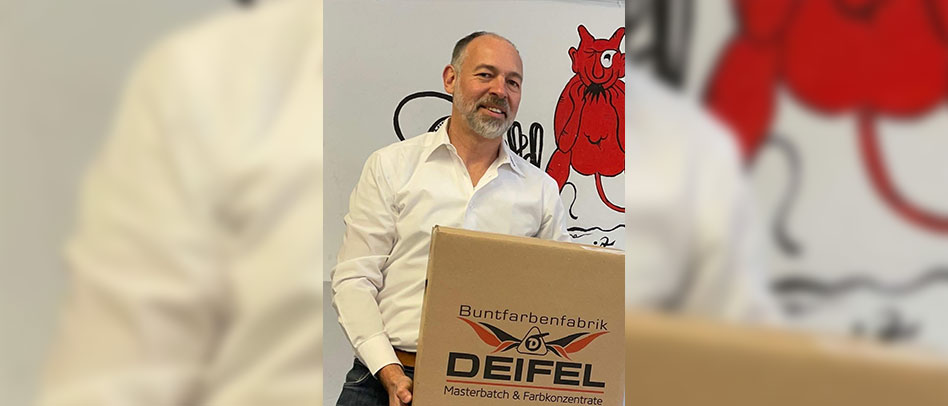“Fakuma is the Most Important Trade Fair for Our Company”

Bernd Schäfer, Managing Director of Deifel GmbH & Co. KG Buntfarbenfabrik, Schweinfurt, Germany
“Only those products which are optimally designed, engineered and produced – in terms of recyclability – will be good products in the future.” The Fakuma trade fair team spoke with Bernd Schäfer, managing director of Deifel Buntfarbenfabrik in Schweinfurt, about issues concerning the plastics industry and the importance of Fakuma.
Due to the fact that our main sales markets for masterbatch are in Europe, Fakuma is the most important trade fair for our company at which we participate as an exhibitor. For us, it’s an important instrument for maintaining customer relations, acquiring new customers and exchanging information with business partners, students and institutes. Fakuma is distinguished in particular by its familiar flair, as well as minimal leg work at the event. It’s the first port of call for the plastics processing industry after the K trade fair. Visitors have plenty of time to gather information about the latest R&D trends from the exhibitors, and to establish contacts. As opposed to the K trade fair, everything feels a lot less hectic.
All Important Players Represented at Fakuma
The most important players in the field of plastics processing are all represented at Fakuma, from machine suppliers to peripherals manufacturers and raw materials vendors, right on up to institutes and networks. One of the event’s big advantages is its size: Fakuma remains within a scope which allows visitors to attend the trade fair on one or two days and gather information without being entirely overwhelmed. The brightly lit exhibition halls are very pleasant.
Environment, the sustainability of plastics, bio-polymers, PCR materials, networking amongst production systems and optimisation of production processes in terms of energy are clearly among today’s most important technology trends in the plastics industry. Plastics are highly beneficial in innumerable applications which would be inconceivable without them today. The perception of plastics by the general public has become quite negative. Plastic, which was highly praised as an emerging wonder material at the beginning of the 1950s, is no longer appreciated to the same extent today due to environmental problems.
The great challenge of the future will be to focus on opportunities for reusing and recycling the plastics and composites which are brought into circulation already during the product development phase. Only those products which are optimally designed, engineered and produced – in terms of recyclability – will be good products in the future.
New Colour Masterbatches for Electromobility
At Deifel, we’re currently developing a large number of colour masterbatches for PBT, PA66 and PA12 polymers, which are used in the field of electromobility. The special technical and mechanical demands placed on the finished components must also be met by the colour masterbatch. This is a considerable challenge for us but, thanks to our many years of experience, we can offer our customers good solutions. Beyond this, our R&D work is also focussed on the issue of colouration for bioplastics and PCR materials.
We were one of the first masterbatch manufacturers in Germany to achieve climate neutrality in 2021, which means we’ve reduced our carbon footprint considerably in recent years and can now compensate for our remaining CO2 emissions by supporting certified climate protection projects. This is an important initial step, which we of course also expect our raw material suppliers to take in the coming years so that we can offer CO2-neutral products.